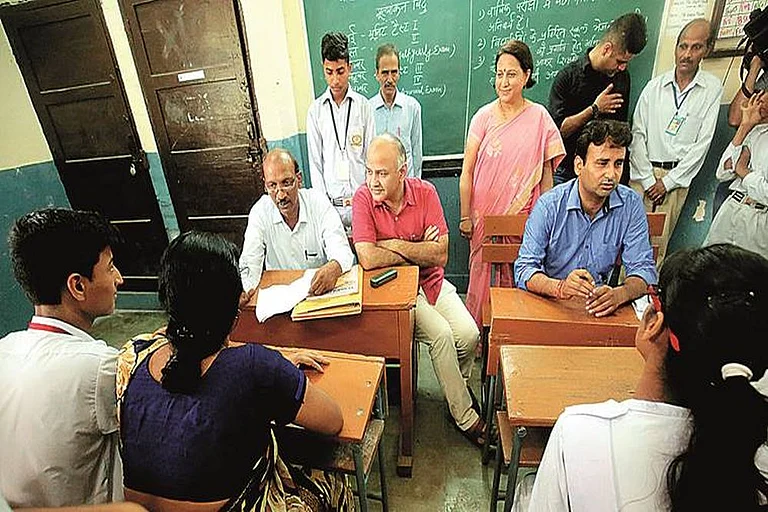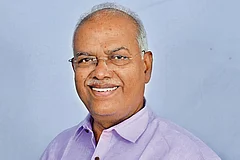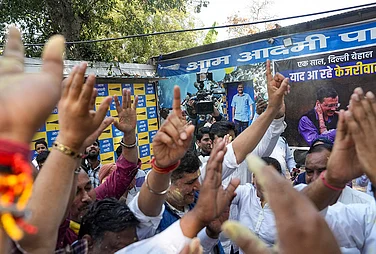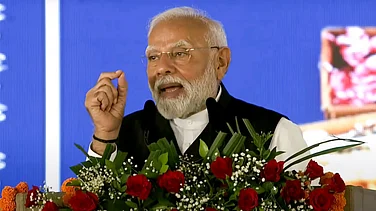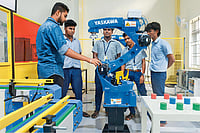Gopinath, the headmaster of a Panchayat Union Middle School (PUMS) in Vasanthanadai, a small village in the Anaicut block of Vellore district, is brimming with excitement. He can’t contain his enthusiasm as he talks about the remarkable success of the breakfast scheme. Around 25 Narikuravar students, who usually skip breakfast, are benefiting from the scheme. Previously, they would hastily grab a meal at a nearby eatery, but were still left feeling hungry. Additionally, there are about 40 to 45 students whose parents work as construction workers and leave early, relying on the mid-day meal as their first substantial meal. With the introduction of the breakfast scheme, these students now arrive early, displaying improved energy levels and enthusiasm for learning. Gopinath believes the scheme is transformative for them. “The fact that the plates and tumblers are provided for each child, and they don’t have to carry it from home might seem small but it is a significant aspect of this scheme. In Anaicut block, there are several villages on the hillside, and students have to walk a distance before reaching school. Besides giving them food, the government has made sure that they don’t have to carry the vessels. This has really had an impact in terms of attendance and their own interest in continuing the education.”
When a government welfare scheme extends its positive impact beyond its intended beneficiaries, it becomes a pioneering initiative and sets a commendable example for other states to follow. The Chief Minister’s Breakfast Scheme is a prime example of such a program.
“Continuing the rich tradition of the State’s pioneering welfare schemes, the Hon’ble Chief Minister has once again etched the name of Tamil Nadu in the annals of Indian history by launching yet another flagship scheme of the Government ‘The Chief Minister’s Breakfast Scheme’ is a scheme that will be the model for the entire country in the years to come. The trend has already started with the State of Telangana having emulated this scheme, following the footsteps of this Government. After a pilot conducted in 1,543 schools for 6 months, the scheme has been extended to all the 30,992 Government primary schools, covering 16.85 lakh children. This scheme provides a well-curated nutritious breakfast to lakhs of students from classes I to V, thereby increasing their nutritional levels, and improving their attendance and learning outcomes. In addition, the scheme also acts as a boon for lakhs of working women and mothers, whose onerous responsibilities are shared by this Government, giving a further fillip to women empowerment.”

These lines are from the customary speech given by the State Government to Tamil Nadu Governor R.N.Ravi which he had skipped reading on the first day of the recently convened assembly meeting. In May 2022, Tamil Nadu Chief Minister M.K.Stalin announced that breakfast will be provided to primary school children from 1st to 5th standard studying in Government schools on all school working days. It is one of the five schemes announced to mark the completion of one year of the DMK Government.
“The quantity of raw material of the food is 50g per child per day. Locally available millet-based breakfasts also be utilized for at least 2 days a week. This is ensuring approximately 293.40 calories of energy, 9.85g of Protein, 5.91g of Fat, 1.64g of iron, and 20.41g of calcium for each child” says the Social Welfare department.
This historic scheme was launched by the Chief Minister at Madurai on September 15, the birth anniversary of C N Annadurai, former Chief Minister of Tamil Nadu and founder of DMK. In the first phase, Corporations, Municipalities, and Panchayats were selected based on the high prevalence of anaemia as per National Family Health Survey (NHFS-5) data, economically backward blocks as per State Balanced Growth Fund (SBGF), habitations of tribal population and inaccessibility of the areas, were covered under this scheme. The Scheme was initially implemented in 1,937 Government Primary Schools covering 1,48,315 students studying from Class I to Class V.
A study by the Tamil Nadu State Planning Commission finds that of the 1,543 Elementary schools, where the scheme was implemented in the first phase, the attendance of students had increased in 1,319 schools. Attendance had increased by 10% in 624 schools, 20% in 462 schools, and 30% in 193 schools. In Tiruppathur, Perambalur, Ariyalur, and Tiruvarur districts, attendance of students had increased in all the schools where the Breakfast Scheme was implemented.
After this successful outcome of the scheme, in March 2023, the then Finance Minister Palanivel Thiyagarajan announced during his Budget speech that the “Chief Minister’s Breakfast Scheme will be expanded to cover all the 30,122 Government primary schools in the State from the coming academic year”. Rs.500 crore was allotted for the scheme in the Budget for the benefit of 18 lakh students studying from Class I to Class V. Recently, the scheme is extended to government aided schools as well, this will benefit an additional 2.5 lakh students. The expansion of the scheme was also launched in the same year by the Chief Minister at Thirukkuvalai in Nagapattinam.
The mid-day meal scheme, which provides education and health to school-going children, was started by the Justice Party in 1922 and has been extended by various subsequent governments. Now the Chief Minister’s Breakfast Scheme, launched after 100 years, not only improved the education and health of students, but also reduced the workload of parents, especially mothers.
MORE FROM THIS ISSUE
The Chief Minister’s Breakfast Scheme is poised to stand out as one of the most effective welfare schemes initiated by the Government of Tamil Nadu. As the Chief Minister once remarked, the scheme is an investment into the future of a child.








